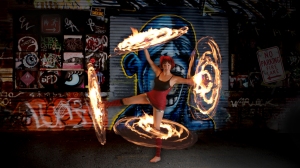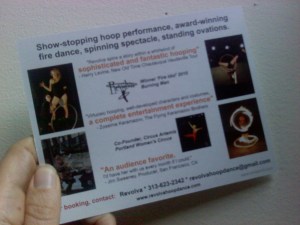
Do you have a job?
“Do you have a job?” Find out how this question sounds to independent artists who are doing ALL THE JOBS. This post is re-published from 2011, when it was first published here.
* * * *
During a recent night out in San Francisco, another performer and I struck up a conversation with a fellow bar patron. Life details emerged, and it wasn’t long before the question arose. The one all performers must navigate. The one that caused my friend to look at me, eyebrows raised, suppressing a laugh (or possibly a horror-movie-style scream).
“So do you two just perform – or do you also have jobs?”
It doesn’t matter how many contracts pass through our hands, how many emails are sent, how much time is dedicated toward editing video and answering phone calls. It doesn’t matter how many hours of our lives are spent not “just performing,” not even “just rehearsing,” but also doing the administrative, marketing and promotional work that would be done by countless people and departments within a typical company. The question still lingers:
“Do you have a job?”
To be honest, there are two answers to that question. The first one involves falling to the floor, clutching one’s belly and rolling around, laughing so hard that it’s nearly impossible to discern your words, which are: “A job? A JOB! Ahh haaaaa haaaaaaaa!”
The second answer calls to mind an old sketch from the show “In Living Color,” in which a West Indian family gets through life by piecing together so many odd jobs that one job just winds up sounding lazy.
Q: “Are you just a performer, or do you also have a job?”
A: “I’m a performer. So I have eighteen jobs. Thanks for asking.”
Don’t get me wrong. I understand that people are focused on the end product of performance, the time spent on stage. They may understand that involves some rehearsal. They probably haven’t spent too long considering any other work involved. They also view performance as fun (which the end product often is). In their own lives, they may have been conditioned to think of a “job” as work and “fun” as not-work.
Ergo, performance is not a job.
“Do you have a job?” can be taken as a compliment, mixed with a bit of longing. What they’re really asking is: “Have you been able to support yourself by performing, or do you also have to deliver pizzas?” In my own life, the answer to that question is: I HAVE been able to support myself entirely by performing. I have also mixed that performance career with freelance writing.
Sometimes, I don’t have any writing clients, and I’m just performing, for long stretches of time. Sometimes, I have a writing client that requires a lot of focus, and I downgrade the amount of gigs I can do. This is my own personal path, forged because I love to perform and I love to write, and I have noticed through direct feedback that I’m able to touch more lives when I create than I can when I work a job that has nothing to do with my gifts (I tried).
But I can honestly say that one of the most challenging, edgy, time-consuming, risk-taking, educational, work-intensive endeavors of my entire life has been building my performance career. When people ask me (either out of disdain or wonder), “Do you just perform, or do you also have a job?” – and I reply that I perform, and I also work as a writer, I don’t think they understand I am NOT saying, “I have a fun activity and a job that you might consider real!” Instead, I’m saying, “I have a job that’s eighteen jobs in one – and another job. So I have nineteen jobs. Thanks for asking.”

Spinning a yarn. (Writing the tour blog for the New Old Time Chautauqua Vaudeville Tour.) Photo by Michelle Bates.
In solidarity with other professional performers, I wanted to zoom in on the performance part of my life and break down what we actually do for a living. As we grow, it’s possible to pay for assistance, and some of us do have help/ management. But I’m going to state all of the following tasks because before, and even after, we form a reputation, making sure they are accomplished (even if that means by hiring one or more people to help) is on no one’s shoulders but our own:
- Booking Agent – Want to earn money so that you can continue to eat while you put your art into the world? As a performer, you must connect yourself with shows. Someone else can also do this job (it requires finding the right agent and giving that person a percentage of the profit). When a show arises, a large amount of psychic energy must be spent deciding which number(s) you will perform, how many hours you will be at the event, how much space is available, what kind of performance they are suggesting, whether or not the client’s expectations are realistic. There are contracts to negotiate and sign. There are gigs that arise and take up weeks of time that appears to be leading somewhere – only to fall through. There are major gigs that pop up at the very last minute, in California, when you just agreed to be in another state. Performing is fun. It’s necessary for the world to contain art. And each minute on stage is connected to about eight zillion minutes of back end time that it took to allow the world to contain your art. I’m just sayin.’
- Administrative Assistant – Most corporations, schools, non-profits, churches, restaurants, car washes, grocery stores, nail salons – pretty much every organization on earth – has a buffer between the public and the organization itself. Guess what happens when people call performers about a gig? Guess what happens when performers receive an email from a client, a fan, a reporter or a stalker? Performers put on our administrative assistant hats and administratively assist our selves. Thank you very much.
- Director of Marketing – You might have a business card for the organization where you work. Did you personally hire the designer and oversee all aspects of that business card’s creation? Or did you stay up all night, nights in a row, designing that business card yourself? Have you spent months filming your own promotional video footage, then teaching yourself how to use video editing software so you could cut that film together, with sound? Did you know what “</br><em>” means and how to add widgets and paypal buttons and navigate html, even though you never went to school for web design? If you answered yes to most or all of these questions, congratulations. You are probably a performer.
- Public Relations Specialist – I feel grateful that past experience with both receiving press releases (as a journalist) and writing them (for clients) has helped me understand how to pitch my own performance projects to the media. But if I hadn’t learned that on-the-job as a writer, I would have had to learn it on-the-job as a performer. The world’s journalists and newscasters aren’t following my every move on twitter, waiting for the breaking news that I will be doing a show. The press must be contacted with information. Someone must contact them.
- Social Networking Manager – Speaking of twitter (and Facebook, youtube, blogs, etc), keeping up with a network of people who are passionate about the same art and promoting gigs to potential audience members and clients is a full time job, in an of itself. Unfortunately, it’s just a full time job that no one considers, while asking performers, “Do you have a job?”
- Travel Agent – Want to book a tour down the west coast? Or maybe you’ve been hired for a gig in Paris but then want to spend some more time hitting European events, while you’re on the other side of the pond. Better get on kayak.com and pull up your frequent flyer numbers and figure out bus routes and train routes and baggage restrictions (hoops count as a bag, and every single time you go to an airline counter, they will be unsure how to attach the tag or whether they count as oversize baggage).
- Business Manager – Try spending five weeks in Europe and saving all your receipts in a pocket of your suitcase, which incidentally has gotten wet in a leaking tent a the European Juggling Convention.
- Costume Designer– A performance is a spectacle that causes audiences to laugh, cry, think, hope, believe. What we wear on stage, whether or not our art is mainly visual or aural (juggler vs. opera singer) is inseparable from the act itself. To that end, many of us have an idea of what clothing would best support our performance – and wind up making it ourselves. Or modifying something existing. Or swimming through a stream of online stores, searching for exactly what we need. This can take hours, days, weeks.

You know how many wigs it took to find the right “Alex, from Flashdance”?!? Also in this act: real welding torch/hood/mechanic’s jumpsuit.
- Music Editor – A few years ago, I used to contact my friend Andrew to say, “Hey, can you edit 30 seconds of ‘The Chicken Dance’ together with the song ’99 Luftballoons,’ with the sound of a record scratching, in between those tracks?” And then we’d go back and forth for a while, via email, until it was exactly right. Now, when I’m doing a show, and I need to knit together songs, I use Garage Band. But first I had to learn how to use the program. I taught it to myself.
- Performer – Wait, what? Is there any time left to even rehearse and develop one’s act? Yes. There is. Sometimes, it comes at the cost of sleep. Sometimes, it’s hard to create while simultaneously expending so much mental and emotional energy on all responsibilities listed above. Sometimes, artists linger in obscurity or sink into deep depression because it is so hard to navigate everything involved with dedicating a life to art – including the misperception that our work is non existent or less valuable than something like having a corporate job. But it happens. Through nerves, through sweat, through failures and successes and self-doubt, performers forge ahead. Maybe we’re crazy. Or maybe we’re less crazy than people who stifle their creative urges and talents because the process of putting them into the world is too frightening.
I’m not complaining about life as a performer. I’m only pointing out, for people who don’t know, that it’s less a selfish life led by lazy, lucky people – than it is a selfless one led by people who often spend every waking moment dealing with (or even thinking about) some aspect of how to raise our art into the world, the way a mother raises a child.
So the next time you’re tempted to ask a performer whether she “also has a job,” why don’t you instead ask her obscure questions about i-movie, about bus prices between Bristol and Edinburgh or about what to bid on a two-hour walk around gig? If she knows the answers, give her a hug.
* * * *
SUPPORT THE ARTS
Revolva is based in the San Francisco Bay Area. As of 2015, she is currently writing most of the time (to recoup energy from years of traveling gigs), and working toward a one-woman show. If you think her work is rad, leave her a tip.
Featured “Job?” image by Christian Korsager CC BY NC 2.0
Follow RevolvaShare This Post



